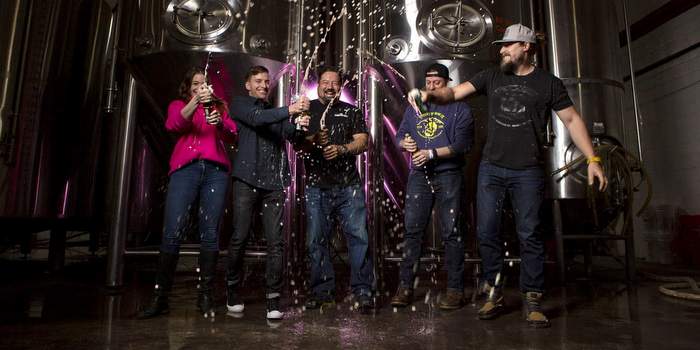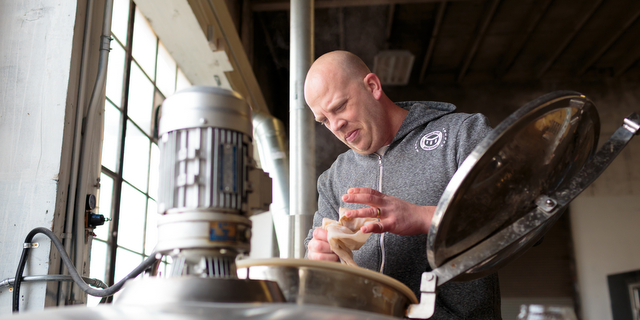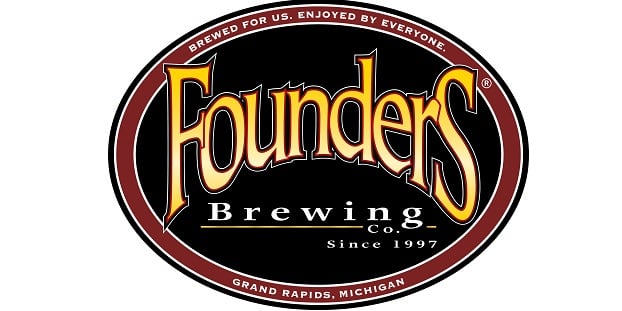
The pandemic seems like a dicey time to go all-in on an on-premise beer business. That’s what franchise sales company Raintree assumed when it started to pitch Pennsylvania-based Voodoo Brewing as an opportunity to potential franchisees.
“We told Jake Voelker and Matteo [Voodoo Brewing founders], ‘look, guys, we aren’t going to see anything this year, but we still need to start to market the franchise because next year, it’s going to be crazy,’” said Brent Dowling, CEO and cofounder of Raintree. There are around 4,000 franchise brands operating in the U.S. right now, and Raintree represents about 15 of them at a time. “Think of what we’re asking. We’re all scared shitless for money, and I can’t tell you when it’s going to be open, but yeah, give me $500,000, and trust me, it’ll be OK.’
“But here’s what’s crazy — it’s been really busy, like I didn’t expect.”
Yes, despite the most difficult year the indie industry has ever faced, entrepreneurs are still chomping at the bit to get into the craft beer business. In 2020, Raintree and Voodoo awarded three franchisee locations in Las Vegas, with the first on track to open this spring. There’s another in Indiana, Pennsylvania and then another “15 different markets pretty far into the discussion right now, all across the country.”
This just barely scratches the surface of where Dowling thinks Voodoo can go, too. “We’d like to see probably a hundred open in the next three to five years,” he says. “I might be a little conservative there, based on what we’ve seen in the last three months, but I just think we’re going to see big growth.”
Is this just hype by the franchise sales team? Maybe. But I suspect it’s not because Raintree is so hyped on Voodoo’s opportunity as a franchise business that it has jumped in as an actual franchisee, staking claim to the Denver area — something they have never done before.
“We evaluate, I don’t know, maybe three to five franchise brands a week,” Dowling said. “With Voodoo, when we really got to understand it, and how we were going to franchise it, once we saw under the hood, I knew this was a business that is going to go galactic if it’s done right. We had to get in any way we could.”
Why Voodoo?
Voodoo’s story starts like any other, with some brothers who liked beer: “It started when my brother, myself and a couple of my highschool friends bought a local bar,” said Matteo Rachocki. “It was called Northgate Inn and was located in Meadville, Pa. We turned it into the area’s first craft beer bar, and we were offering beer from all different parts of the U.S. It was the first time these styles and brands were offered to Meadville.”
They had always planned on building a brewery of their own though, and one day “I got a call from my brother while in New York and he said ‘I have a crazy idea to get our brewery started.’ My brother had set up a meeting with the local brewer, and we started an arrangement where he relinquished control of his business to my brother and I and just became a full time head brewer. Between the two of us, we refined the business plan and the liquid. That took a solid six months to a year in 2011, and from there within six months he and I opened the first tap room in Meadville called Voodoo Brewery.”
So, why Voodoo? The question is more, “why not Voodoo?” Since that first taproom, Voodoo has dialed in some award-winning recipes and opened up seven locations in under seven years. They knew they had a model that could be replicated, with a product that would make it work. So, why stop there?
“While opening our Grove City, Pa., location, we had the conscious decision to write, record and track our every move of how we built the pub out,” Matteo said. “It was one of the pubs we built from stud walls and unfinished floors. By the time we were done, we felt we had the playbook for franchising.
“Jake did some self-education, and we got ourselves legal to start pursuing franchise sales. We had been looking for a marketing team to help us, because from what we had learned in our research is that the first few locations are the toughest to sell. We had sold our first two already, so we felt we could be attractive to a marketing firm to help us. We came across Raintree Sales which is arguably one of the best and gave them a call. We were just excited to get a return call from them.”
“I’m a franchise guy, not a beer guy,” Dowling said. “I know they’ve got this cult following, but that’s a difficult thing to sell to someone across the country who has no idea who you are.”
Via the franchise model, Voodoo can solely focus on the beer, while the franchisees take the Raintree playbook and execute it, running the business side of things on the ground in their location as their sole focus. Voodoo franchisees will not be producing their own beer or trying to replicate Voodoo recipes. Voodoo has built a 30,000 bbls a year production facility that will be serving its nationwide franchisee footprint.
It’s a model others in craft beer might want to mimic.
Why now?
If you’re not brewing the beer on site, and then don’t need to install a brewhouse, you don’t have to worry as much about real estate (or overhead). You get the cachet of being a craft brewery, with great beer made by a smaller, indie producer.
“The real estate opportunities that are popping up are once in a lifetime, and they’ll be like that through probably at least a couple quarters next year. It’s shitty, but businesses — mom and pops — are going to continue to close, and landlords are going to get somebody else in at half the cost, or maybe less. That’s just the deal right now. So smart entrepreneurs are looking at that,” Dowling said.
We’ve noted previously (in pre-Covid times) that expansion via real estate, and opening a new taproom in a new city or state was becoming something of a trend — a combination of the better margins selling out of a taproom, the tough competition for shelf space and the general advantage a true “local” brewery has in its own market. The problem with this trend is it’s much easier said than done. It is expensive and an insane amount of work.
This is where the franchise model comes into play.
Why franchise?
I admit, I was skeptical about this idea. Isn’t craft beer about local artisans? What about the freedom and creativity? Well, it’s still there, just in the hands of experienced pros like Jake and Matteo. In a way, franchising Voodoo keeps the spotlight where it should be — producing and selling good beer. With that beer only being available at Voodoo franchise locations that all have a unique feel, run by local owners, there is still that local cache too.
“If you have an interest in craft beer, and you appreciate it, here is a way for you to live and breathe it, but you won’t have the headaches of creating it,” Dowling said.
It eases headaches all around, actually.
“Moving your business model from Pittsburgh to Colorado and opening up, there’s a lot of extra costs in doing that, and then doing that each time it becomes this giant beast to manage,” Dowling said. Raintree basically handles all of the stuff. They have a network of 1,500 consultants. Its job is to market and position a brand like Voodoo, to get in front of a lot of people. “I’ve got to hire a general manager, and for that general manager, it’s their job. He or she’s going to run it the best they can, but it’s not their heart and soul, it’s not their livelihood on the line.”
Contrast that with a franchisee. They are the owner and are in 100 percent. At the same time, putting up the money to open a franchise doesn’t come with the same risks of starting a business from scratch. They can focus on executing the game plan and get the support of an operations team that’s been there and done it.
For the franchisor, like Voodoo, in exchange for their branding and beer and an operations guide written so the franchisee avoids the mistakes Voodoo made along its own 12-year path, Voodoo will take a 6 percent cut of the revenue. That location doesn’t have “their money” on the line, but it does put their product and their good name on the line.
“Both sides have to make it work, and that’s why it’s a beautiful model,” Dowling said.
“Quite simply, aside form the liquid itself, craft beer is culture,” Matteo said. “People gravitate to warm and cultural spaces and feelings. The feeling comes from employing great people and getting the business integrated into the local economy and community by way of job creation and as an active business in the area. Our locations, franchise or not, actively participate in the community through beer festivals, ale trails, beer walks and by sponsoring and donating to countless local nonprofits and charities. It’s a big part of what makes Voodoo, Voodoo. A new business in the area becomes much bigger than beer. This particular model works and has that true local business feeling that is intertwined into the fabric of any community.”





Leave a Reply
You must be logged in to post a comment.